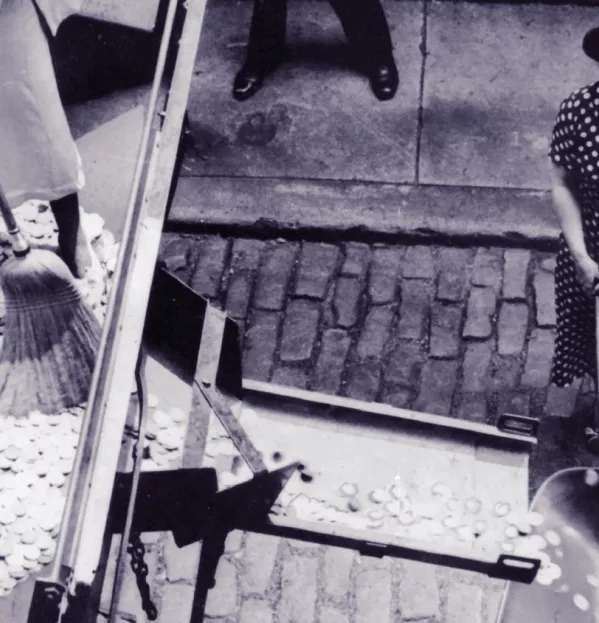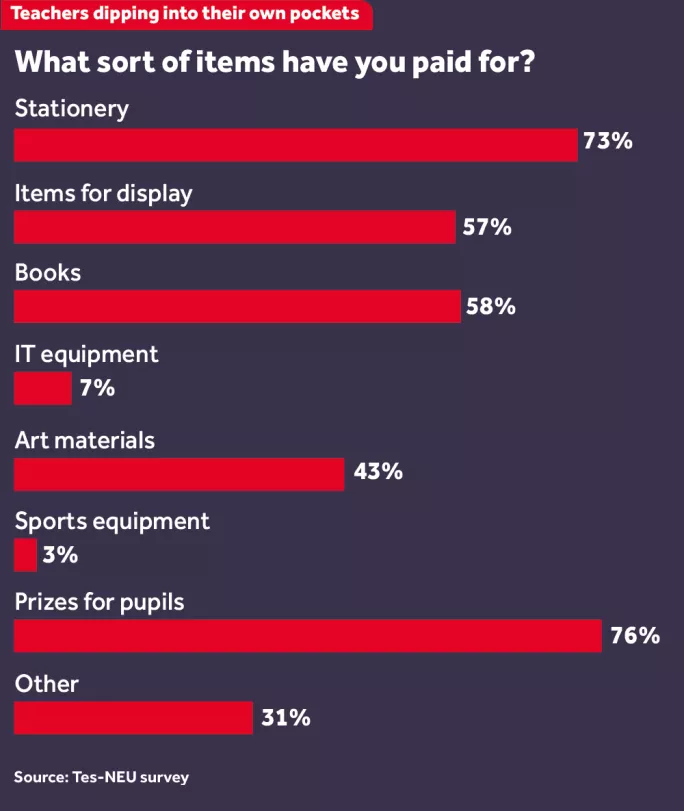Teachers’ own cash keeps the classrooms running

The government’s latest school funding announcement, confirming that there will be more money available to schools from next year, might have seemed like good news.
But modest funding increases are unlikely to provide much comfort to those teachers and parents who are increasingly being asked to put their hands in their pockets to pay for school essentials such as books, stationery and art supplies.
A Tes survey of more than 1,800 teachers, conducted jointly with the NEU teaching union, reveals that the vast majority - 94 per cent - are having to pay for classroom equipment themselves. Many of them are spending hundreds of pounds.
Two-thirds of the teachers polled said that they had been forced to pay for items or contribute cash because their schools were so short of funds.
“This is a terrible indictment of where we are, in terms of school funding,” says Geoff Barton, general secretary of the Association of School and College Leaders. “That teachers are paying for this out of their own pockets - and we all know about teachers’ pay. It shouldn’t be like that.”
Some teachers are even being asked to make termly donations, for example via direct debit. One in six said that they have made cash donations to their schools, with some giving more than £1,000 last year.
Andrew Morris, NEU assistant general secretary with responsibility for pay and conditions, says that this could be a slippery slope. “It’ll give the government cover from having to increase funding to the extent that it should do,” he says. “There’s a big step-change between ‘We haven’t got the cash to let you buy things’ and ‘We haven’t got cash - give us some of your money.’”
Almost three-quarters - 73 per cent - of those surveyed said that they regularly purchased stationery items, such as pens, pencils and board markers. Fifty-eight per cent had paid for books. And 43 per cent had paid for art materials. One respondent said: “I need resources to create the WOW factor for my lessons … and there is so much pressure on us not to spend the school budget.”
Another said: “While I’m not required to do so, I do tend to buy what I need so I can do my job properly in a stimulating environment.”
‘Doing DIY’
Taking things a step further, some teachers even talked about buying emulsion paints, DIY materials and storage equipment for their classrooms. One said: “I spend every Sunday doing DIY at the school.”
A third of the respondents said they spent more of their own money on equipment and resources last year than they had previously. Morris says: “Even teachers in their first year of teaching are becoming used to the idea that they have to pay for necessary resources. It’s being regarded as a regular feature of the job.”
Barton points out that teachers have always spent small amounts of their own money on classroom supplies: in the past, it was not uncommon for a holidaying teacher, for example, to pick up something interesting.
But, he adds, this is different from the current situation. In fact, 61 per cent of those surveyed specifically said that they were paying for supplies because their schools did not have funds. And many spend significant sums of money. A quarter - 26 per cent - said they spent between £101 and £500 in a single academic year on equipment or resources.
“It’s the sheer bleakness of the situation - that it’s led to teachers thinking that this is the only way they can make their classroom attractive,” Barton says.
One head of English at a Sussex secondary said her school had recently announced that it would not even be providing paper towels for staff to wipe their hands. “And you think, ‘Is toilet roll going to be next?’” she said.
Last week, education secretary Justine Greening confirmed details of the new national funding formula, stating that every school can expect their budget to rise by at least 1 per cent. But unions argue this will not be enough to deal with rising costs and the severe real-terms cuts in recent years.
Meanwhile, a rising number of parents are being asked to contribute cash to schools. And of 1,500 parents surveyed by parents’ association PTA UK, nearly a third - 29 per cent - said that they had been asked to supply teaching equipment, such as stationery and books.
Michelle Doyle Wildman, acting chief executive of PTA UK, says that the government’s funding announcement is a step in the right direction, but that “schools will still feel the pinch in real terms”.
“Parents are a silent army supporting our schools to give every child the best possible outcome in their education,” she says. “We are concerned that teachers and parents are reporting that they are both contributing more to provide the essentials which many expect to be provided by the state.”
A Department for Education spokesperson says: “Our new fairer funding formula will replace the outdated funding system which saw our children have very different amounts invested in their education purely because of where they were growing up.”

You need a Tes subscription to read this article
Subscribe now to read this article and get other subscriber-only content:
- Unlimited access to all Tes magazine content
- Exclusive subscriber-only stories
- Award-winning email newsletters
Already a subscriber? Log in
You need a subscription to read this article
Subscribe now to read this article and get other subscriber-only content, including:
- Unlimited access to all Tes magazine content
- Exclusive subscriber-only stories
- Award-winning email newsletters